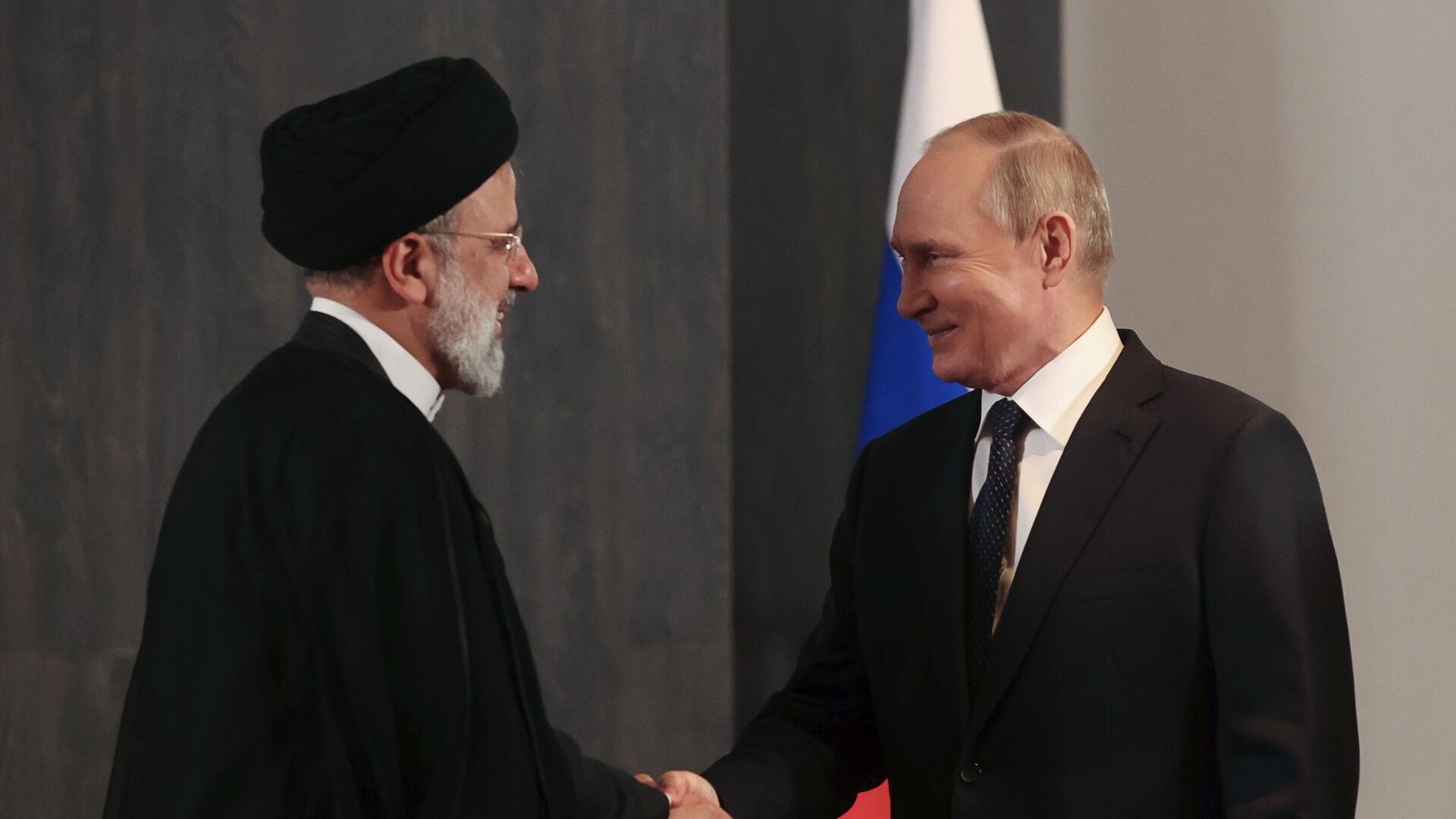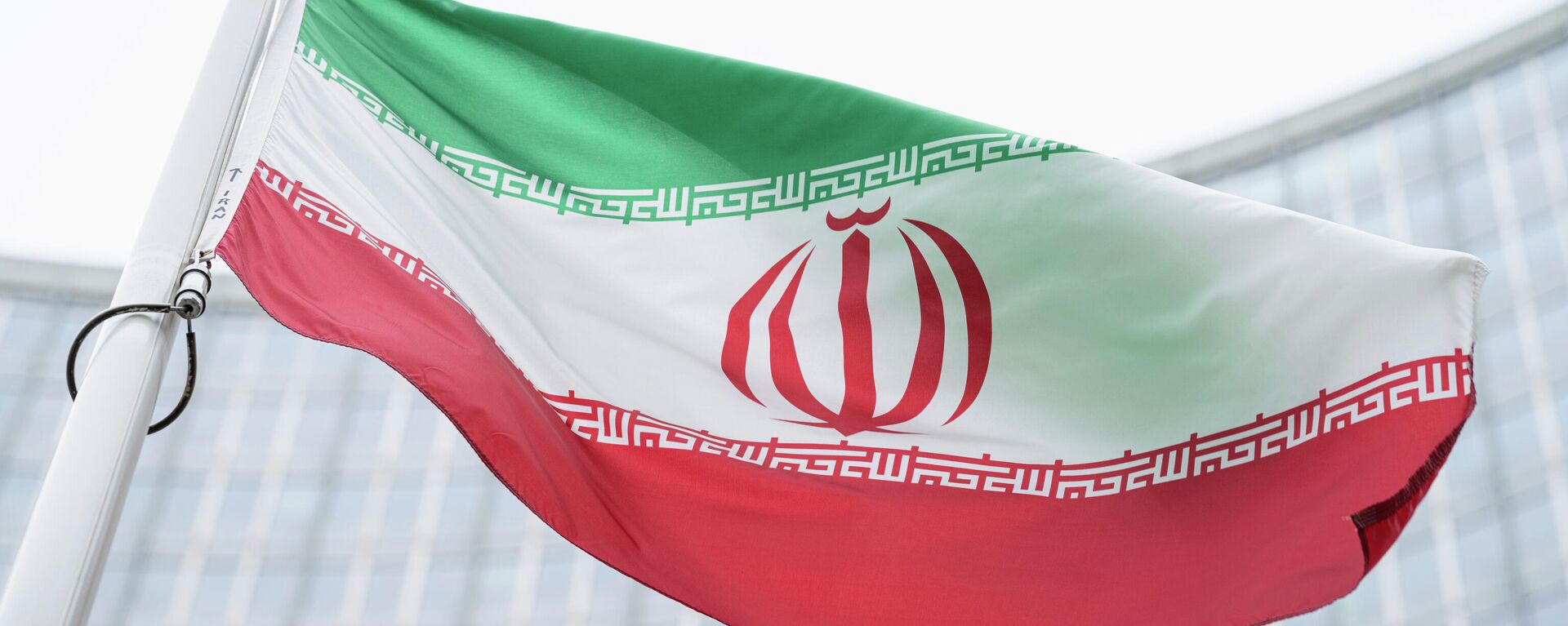https://sputnikglobe.com/20230518/as-russia-iran-cooperation-increases-us-sanctions-lose-their-bite-1110444376.html
As Russia-Iran Cooperation Increases, US Sanctions 'Lose Their Bite'
As Russia-Iran Cooperation Increases, US Sanctions 'Lose Their Bite'
Sputnik International
Economic, military, and cultural cooperation between the Russian Federation and Islamic Republic of Iran has burgeoned in recent years, with trade turnover reaching $5 billion in 2022.
2023-05-18T19:02+0000
2023-05-18T19:02+0000
2023-05-18T19:02+0000
analysis
iran
ted cruz
russia
cooperation
sanctions
https://cdn1.img.sputnikglobe.com/img/07e7/05/12/1110444216_0:0:3013:1696_1920x0_80_0_0_9152ca3a563f95cd04b3e1a9ebf892d9.jpg
Hossein Askari, the Aryamehr Professor of International Business at The George Washington University in Washington, DC, told Sputnik on Thursday there are a number of reasons the US feels so threatened by the growing cooperation between Russia and Iran, including insecurity over the effectiveness of the sanctions it has levied on both nations."Please note that it is US arrogance that has resulted in the current state of affairs. US policymakers have felt that they could take on all comers as the world's premier economic and military power. They must now face the music," Askari told Sputnik."It opens the door for many countries who also resent freewheeling US sanctions. Iran and Russia could provide a counter to US sanctions. If China were to join Russia and Iran, then the US would largely lose sanctions as a coercive tool of foreign policy," he explained. "Essentially, such Russia-Iran cooperation could open the floodgates as others defy US sanctions."He also noted that Israel’s close relationship with the United States meant that "US politicians do all they can to protect Israeli interests," and Jerusalem is strongly set against Tehran.Inversely, growing Iran-Russia cooperation also weakens Washington’s leverage over the Arab states, too, Askari noted.Askari also noted that Iran could potentially provide the Russian Navy with an important base on the Indian Ocean, which it lacks outside of the newly approved base in Port Sudan, on Africa’s Red Sea coast.On Thursday, US Sen. Ted Cruz (R-TX) introduced the Sanctions Against Destabilizing Iranian-Russian Aggression (SADIRA) bill that would extend US sanctions against Russia to Iran as well, targeting sea harbors, airports, oil tankers and banks used by Russia and Iran for military purposes. It would also freeze Iranian financial assets abroad and require the Biden administration to use them to pay American victims of what he called "Iranian aggression" and to compensate Ukraine.Askari said that whether Cruz gets significant bipartisan support for the bill will depend especially on the Israeli lobby in Washington."If they feel that Israel is threatened, they will support Cruz's bill. Also, please note that sanctions are used as the kitchen sink. Lawmakers pile it on to feel good that they have done something, regardless of their effectiveness and wider fallout now and over time. So putting it all together, I would think that it is likely that he will get bipartisan support. But again, I don't think that the bill would have much bite," he explained.On Wednesday, Russian President Vladimir Putin and Iranian President Ebrahim Raisi signed a $1.6 billion deal toward construction of the Rasht-Astara railway, a key part of the International North South Transport Corridor. Askari said the project would provide both nations with an easier way to ship military assets across their borders."Although Rasht is in northern Iran, this railway will open up trade through Iran through the Persian Gulf for both exports and imports for Russia and enhance Iran-Russia bilateral trade and beyond," he explained. "It will also further reduce US influence in the Persian Gulf and enhance both Russian and Iranian influence with countries of the GCC (Gulf Cooperation Council) and Iraq."
https://sputnikglobe.com/20230512/made-in-russia-heads-to-iran-oil-show-2023-1110302013.html
https://sputnikglobe.com/20230501/iran-reopens-diplomatic-missions-in-saudi-arabia-1110006977.html
https://sputnikglobe.com/20230320/russias-iran-envoy-to-sputnik-moscow-tehran-relations-have-acquired-a-strategic-character-1108613856.html
iran
russia
Sputnik International
feedback@sputniknews.com
+74956456601
MIA „Rossiya Segodnya“
2023
News
en_EN
Sputnik International
feedback@sputniknews.com
+74956456601
MIA „Rossiya Segodnya“
Sputnik International
feedback@sputniknews.com
+74956456601
MIA „Rossiya Segodnya“
iran; russia; sanctions; hossein askari
iran; russia; sanctions; hossein askari
As Russia-Iran Cooperation Increases, US Sanctions 'Lose Their Bite'
Economic, military, and cultural cooperation between the Russian Federation and Islamic Republic of Iran has burgeoned in recent years, with trade turnover reaching $5 billion in 2022. The two states have found themselves targeted by US sanctions and meeting in the same Eurasian political fora.
Hossein Askari, the Aryamehr Professor of International Business at The George Washington University in Washington, DC, told Sputnik on Thursday there are a number of reasons the US feels so threatened by the growing cooperation between Russia and Iran, including insecurity over the effectiveness of the sanctions it has levied on both nations.
"Please note that it is US arrogance that has resulted in the current state of affairs. US policymakers have felt that they could take on all comers as the world's premier economic and military power. They must now face the music," Askari told Sputnik.
"If a number of critical countries defy US secondary sanctions, that is, they trade and engage in financial transactions with a sanctions-targeted country, be it Iran or Russia, then sanctions lose their bite. And the more countries that defy US secondary sanctions, that is, engage in sanctions busting, then the sanctions weapon becomes less potent as an instrument for pressuring third countries to tow the US line," Askari said.
"It opens the door for many countries who also resent freewheeling US sanctions. Iran and Russia could provide a counter to US sanctions. If China were to join Russia and Iran, then the US would largely lose sanctions as a coercive tool of foreign policy," he explained. "Essentially, such Russia-Iran cooperation could open the floodgates as others defy US sanctions."
He also noted that Israel’s close relationship with the United States meant that "US politicians do all they can to protect Israeli interests," and Jerusalem is strongly set against Tehran.
"Russia-Iran cooperation strengthens Iran in the region, something that Israel fears. Already you are seeing this in the military field [with the sale of] Russian air defense systems and the pending delivery of 24 Russian advanced Sukhoi Su-35 fighters," Askari said. "In the area of commerce, the more channels available to Iran, barter, routes, etc. that escapes US eyes, Iran benefits."
Inversely, growing Iran-Russia cooperation also weakens Washington’s leverage over the Arab states, too, Askari noted.
"Arabs want to enhance relations with Russia as Russia has influence over Iran, and at the same time they feel pressure to accommodate Iran," he said.
Askari also noted that Iran could potentially provide the Russian Navy with an important base on the Indian Ocean, which it lacks outside of the newly approved base in Port Sudan, on Africa’s Red Sea coast.
On Thursday, US Sen. Ted Cruz (R-TX) introduced the Sanctions Against Destabilizing Iranian-Russian Aggression (SADIRA) bill that would extend US sanctions against Russia to Iran as well, targeting sea harbors, airports, oil tankers and banks used by Russia and Iran for military purposes. It would also freeze Iranian financial assets abroad and require the Biden administration to use them to pay American victims of what he called "Iranian aggression" and to compensate Ukraine.
"I don't believe they will do much," Askari told Sputnik. "For these genre of sanctions to be effective, the US must use military power to enforce them. I don't believe that the US is willing to have direct military confrontation with Russia."
Askari said that whether Cruz gets significant bipartisan support for the bill will depend especially on the Israeli lobby in Washington.
"If they feel that Israel is threatened, they will support Cruz's bill. Also, please note that sanctions are used as the kitchen sink. Lawmakers pile it on to feel good that they have done something, regardless of their effectiveness and wider fallout now and over time. So putting it all together, I would think that it is likely that he will get bipartisan support. But again, I don't think that the bill would have much bite," he explained.
On Wednesday, Russian President Vladimir Putin and Iranian President Ebrahim Raisi signed a $1.6 billion deal toward construction of the Rasht-Astara railway, a key part of the International North South Transport Corridor. Askari said the project would provide both nations with an easier way to ship military assets across their borders.
"It will significantly reduce the bite of US primary and secondary sanctions," Askari predicted. "And again, it may encourage other countries to defy US pressure from secondary sanctions."
"Although Rasht is in northern Iran, this railway will open up trade through Iran through the Persian Gulf for both exports and imports for Russia and enhance Iran-Russia bilateral trade and beyond," he explained. "It will also further reduce US influence in the Persian Gulf and enhance both Russian and Iranian influence with countries of the GCC (Gulf Cooperation Council) and Iraq."





